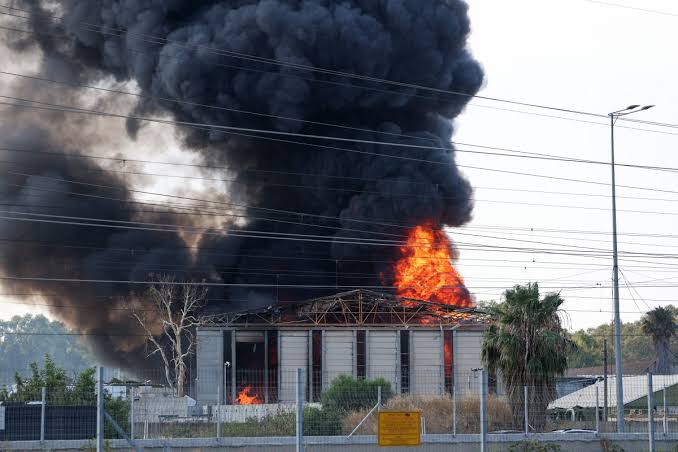
Israel and Iran traded missile strikes for the fifth straight day on Tuesday, escalating tensions as U.S. President Donald Trump abruptly departed the G7 summit and urged residents of Tehran to “evacuate immediately,” fueling concerns of a broader conflict.
A fresh wave of Israeli attacks on Tehran — including a direct strike on the headquarters of state television, which the broadcaster said left three dead — triggered overnight activation of missile defense systems on both sides.
In a statement, the Israeli military said it had hit several targets in western Iran, including surface-to-surface missile infrastructure, surface-to-air missile launchers, and drone storage facilities. The statement was released alongside black-and-white footage showing missile launchers being destroyed.
Shortly after, air raid sirens blared across parts of Israel. AFP reporters in Jerusalem and Tel Aviv described hearing loud explosions as the Israeli army confirmed the launch of missiles from Iran.
“Sirens sounded in several areas across Israel following the identification of missiles launched from Iran,” the military said, adding the air force was “operating to intercept and strike where necessary to eliminate the threat.”
About 20 minutes later, the military announced that it was safe for residents to leave protected shelters. Police reported that shrapnel had fallen in Tel Aviv, causing property damage but no injuries. Meanwhile, the fire service said crews were en route to contain a blaze in the city’s commercial district.
Despite growing international calls for restraint, both Israel and Iran have continued their missile exchanges. The conflict began on Friday when Israel launched an unprecedented aerial assault targeting Iranian nuclear and military sites.
Israel’s army briefly urged citizens to seek shelter, amid growing fears of a regional war.
Pentagon chief Pete Hegseth said the US was deploying “additional capabilities” to the Middle East. The aircraft carrier USS Nimitz left Southeast Asia Monday, scrapping a planned Vietnam stop, amid reports it was heading to the region.
A White House spokesman said US forces remained in a defensive posture.
U.S. President Donald Trump has repeatedly refused to confirm whether the United States supports Israeli military operations and maintained that Washington played no role in initiating the strikes.
Although he initially called for dialogue, Trump later issued a stark warning on his Truth Social platform: “Everyone should immediately evacuate Tehran!” He cut short his participation at the G7 summit in Canada to return to Washington.
He later dismissed speculation that his early departure was to mediate a ceasefire, taking aim at French President Emmanuel Macron.
“Publicity-seeking President Emmanuel Macron… wrongly claimed I left the G7 to work on a ‘ceasefire,’” Trump wrote. “Wrong! He has no idea why I’m heading back to Washington — but it’s definitely not about a ceasefire. It’s much bigger than that… Stay tuned!”
‘One After the Other’
Following years of hostilities and covert clashes, Israel launched a surprise air offensive last week, declaring its goal was to prevent Iran from obtaining nuclear weapons — an accusation Iran strongly denies.
In response, Iran has fired several waves of missiles. On Monday night, the Revolutionary Guards vowed to continue the attacks “without interruption until dawn.”
The spiraling conflict has disrupted nuclear negotiations and raised global alarm over the risk of a wider war. Trump urged Tehran to return to the negotiating table.
U.S. Ambassador to Israel Mike Huckabee confirmed that a missile strike had lightly damaged a facility linked to the American embassy in Tel Aviv. Meanwhile, the State Department has issued a travel warning, advising Americans to avoid Israel.
According to Israel’s prime minister’s office, at least 24 people have been killed and hundreds injured in Israel. Iran reported Sunday that Israeli airstrikes had killed at least 224 people, including military officials, nuclear scientists, and civilians. No updated figures have been released since.
Israeli Prime Minister Benjamin Netanyahu declared that Israel is systematically targeting Iran’s security leadership.
“We’re reshaping the Middle East, and that could trigger significant internal change in Iran,” he said.
Calls to Protect Civilians
Global appeals for de-escalation have intensified.
At the G7 summit in the Canadian Rockies, world leaders — including Trump — urged calm while affirming Israel’s right to defend itself.
“We hope resolving the crisis with Iran will lead to a broader de-escalation in the Middle East, including a ceasefire in Gaza,” said a joint G7 statement, which also reiterated that “Iran must never obtain a nuclear weapon.”
China also appealed for restraint, urging both nations to “take immediate steps to ease tensions” and avoid further destabilizing the region.
Though the U.S. and Iran had held several rounds of indirect nuclear talks in recent weeks, Iran has since said it will not negotiate under fire.
“Iran will continue to respond unless military aggression against us ends entirely,” said Iranian Foreign Minister Abbas Araghchi on Monday.
He also stated on X (formerly Twitter): “One phone call from Washington could silence someone like Netanyahu — and that might reopen the door to diplomacy.”
A senior U.S. official told AFP that Trump had intervened to stop Israel from carrying out an assassination of Iran’s Supreme Leader, Ayatollah Ali Khamenei.
However, when questioned during an interview with ABC News, Netanyahu refused to rule out such an operation.
“This wouldn’t escalate the conflict,” he said. “It would end it.”








